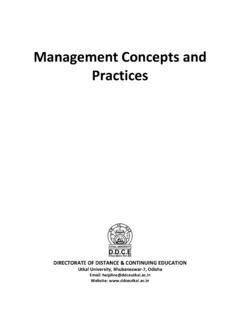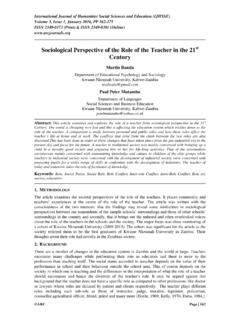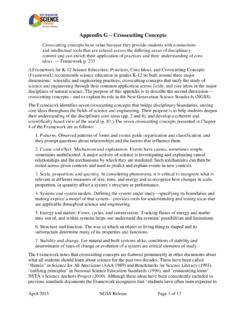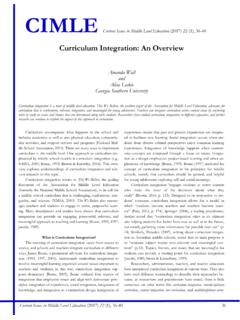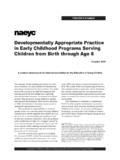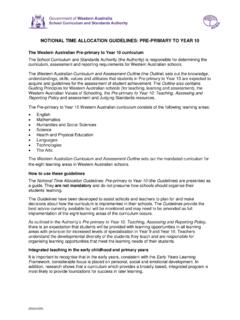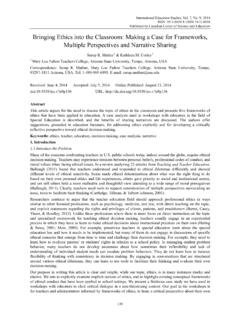Transcription of EARLY CHILDHOOD EDUCATION UNIT.1 Nature, Aims and ...
1 EARLY CHILDHOOD Education1|P a g eEARLY CHILDHOOD nature , Aims and objectives of Pre- school EducationObjective To enable the students understand the nature , aims and objectives of EarlyChildhood EDUCATION . To acquaint with different recommendation. To understand thecharacteristics of Pre- school nature of EARLY CHILDHOOD Care Aims and objectives of Pre- school Secondary EDUCATION Committee (1952-53) on objectives of Preschool Child Care Committee (1963-64). Indian EDUCATION Commission (1964-66). Report of the study objectives of Pre- school Characteristics of Pre- school Significant Reasons for Preschool NatureTheNational EARLY CHILDHOOD care and EDUCATION (ECCE) Policy reaffirms the Commitmentof the Govt. of India to provide integrated services for holistic development of all childrenalong the contiuam, from the prenatal period to six years of age. The policy lays down theway forward for a comprehensive approach towards ensuring a sound foundation withfocus on EARLY learning for every Indian 11thfive year plan has acknowledged the importance of EARLY CHILDHOOD CareEducation as the stage that laysthe foundation for lifelong development and the realisationof a child s full potential and directs that all children be provided at least one yearpreschool EDUCATION in the age group of 3-6 years.
2 EARLY CHILDHOOD Education2|P a g eUnder Article 21A through 86thAmendment of the constitution, free and compulsoryeducation to children in the age group of 6-14 has become a fundamental right, In additionto this, in Article 45 of the directive principles, EARLY CHILDHOOD care and EDUCATION forchildren up to the age of 6 years has been CHILDHOOD care and EDUCATION is necessary as readiness for formal there is universal demand for EARLY CHILDHOOD EDUCATION in the whole Policy in EDUCATION (NPE) 1986 has given a great deal of importance toECCE. Emphasizing the holistic nature of EARLY CHILDHOOD programme, it has extended ECCEto include the component of Care EARLY CHILDHOOD care and EDUCATION (ECCE). Themain elements of care are health and nutrition. ECCE requires that young children to beprovided care opportunities and experiences that lead to their all round development-physical, mental, social and emotional and school has viewed ECCE as an important input in the strategy of human resourcedevelopment.
3 It has highlighted the need of community involvement in ECCE as well as theneed to establish a linkage between integrated Child Development Scheme (ICDS) and(ECCE) programme at all the public sector integrated Child Development Services (ICDS) is the world slargest programme imparting ECCE. Prior to the Universalisation of ICDS and itssubsequent expansion uncovered areas were attempted to be covered by pre-primarysystem within the ambit of the primary school Aims and objectives of Pre school EducationNational curriculum framework (2005) emphasized two years of pre-schooling andconsidered ECCE as significant for holistic development of the child, as a preparation forschooling and as a support service for woman and girls. It advocatedplay baseddevelopmentally appropriate plan of action for children (2005) included universalisation of ECCE as one of thegoals. It specified care, protection and development oppertunities for children below 3years and integrated care and development and preschool learning opportunities for 3-6years EDUCATION is the EDUCATION that a child receive before entering school atthe age five or six.
4 Actually it starts even before the birth of a child. It thereforeincludesprenatal EDUCATION , prenatal and post-natal care also. It includes formal as well as nonformal EDUCATION EDUCATION imparted in a school as well at outside. Pre-primaryeducation in its broader sense may be divided into the following four parts; EARLY CHILDHOOD Education3|P a g e1. Pre-primary EDUCATION from conception to Pre-primary EDUCATION from birth to two and a half From a two and half to four From four to five or six has a wealth of traditional practices in ECCE that date backalmost 5000 value of ECCE lies in the recognition and acceptance that ECCE is a vital developmentneed of all children ECCE must be the first step in the educational ladder and should be partof EFA. ECCE in five year plans of IndiaVarying degree of emphasis in ECCE; voluntary efforts to strengthening of ICDS from 1stto 10thplan. 11thFive year plan (2007-2012)-Development of children at the centre stage of theplan commitment to presolving withvarying options.
5 ECCE in National policiesand programmes (NPE on 1986)Emphasized need for play based and joyful against formal teaching of the 3R s (Reading, Writing and Arithmetic)Right of children to free and compulsory EDUCATION Act to the sargent report (1944), the main objectives of EDUCATION at the pre primarystage should be to give young children social experience rather than formal instruction. To develop understanding of foundations of pre- school EDUCATION . Growth and development in EARLY CHILDHOOD (0-6 yrs)development of skills tomanage an EARLY CHILDHOOD care and EDUCATION centers. Provide guidance / knowledge for working effectively with parents andcommunities for EDUCATION of pre. school children. To gain knowledge and develop skills and attitude required for working with young. To appreciate the health andnutritional needsof young children and to be able toevaluate a diet as regards nutritional adequacy. To be able to identify common CHILDHOOD illness takes care of the sick child and CHILDHOOD Education4|P a g e1.
6 The Secondary EDUCATION Commission (1952-53) on objectives of Pre the child to the joys of learning through companionship and recreationalactivities. Providing oppertunities for developing properhabits of life, cleanness and healthymodes of living. Cultivation of social habits so necessary for a community Child Care Committee (1963-64)Under the chairperson , listed the following objectives verygreat care of the physical development of the child in the very earlyyears in terms of health, nutrition, posture and capacities for habits of cleanliness in the pre- school child at home as well as in adequatenourishment in kind and quantity for growth of vigoroushealthy facilities for training and exercise in personal cleanliness and play ground activities and hand work activities necessary to develop allthe skills of the child to deal with the oppertunities for the emotional development of the oppertunities for developing, good behaviour suitable environment for the development of the senses on which dependthe total mental life and the psychological health of the Indian EDUCATION Commission (1964-66)
7 Develop in the child good health habits and to build up basic skills, necessary forpersonal adjustment such as dressing toilet habits,eating, washing, cleaning etc.; develop desirable social attitudes and manners and to encourage healthy groupparticipation, making the child sensitive to the rights and privileges of others; develop emotional maturity by guiding the child to express, understand, acceptand control his feelings and emotions; encourage aesthetic appreciation; stimulate the beginning of intellectual curiosity concerning the environment andto help him understand the world in which he lives; and to foster new intereststhrough oppertunities to explore investigate and experiments; encourage independence and creativity by providing the child with sufficientoppertunities for self CHILDHOOD Education5|P a g develop the child s ability to express his thoughts and feelings in fluent, correctand clear speech; develop in the child a good physique adequate coordination and basic study group was appointed jointly by the Ministry of EDUCATION and the Department ofsocial welfare (which was a part of the ministry of law and social welfare).
8 The groupconsisted of 13 members including the chair person Smt. Mina Swaminathan, Sri the member secretary of the group made several recommendations on the development of the pre- school promote child health through periodic health care so as to reduce child mortalityand morbidity and offer protection against communicable diseases; promote optimum nutritional standards during the formative years of the child slife to enable him to develop his innate physical and mental potentialities to the full; promote a proper climate and to adopt measures for the healthy and balancedgrowth of the social and emotional aspects for the child s personality; reduce educational disparities by providing planned environmental stimulationaimed at supporting development of the cognitive abilities of the child; build readiness in the child for school learning and thus to help combat wastageand stagnationin the first two years of primary schools; promote an environment of security, love and acceptance and to help the child tobuild up desirable attitude, values and behaviors; protect the child against the social and mental hazards of an unfavorable socialenvironment ; create community awareness of the needs of the pre- school child and to elicitand build community environment and participation in the The objectives of Pre school EducationHowever followings are the objectives of pre- school EDUCATION .
9 Development of good physique which includes ;a. Development of motor Development and coordination of the muscles. Training in hygienic and healthy habits such as dressing, toilet habits, eating,washing, cleaning etc. Learning to share things with others and waits for one s Report of the study group 1972: EARLY CHILDHOOD Education6|P a g e Learning desirable social manners and etiquettes. Learning to express, understand and control one s feelings. Stimulating the child s curiosity abouthis environment and satisfying it. Learning concepts relating to numbers. Expanding knowledge for the solution of problems. Understanding physical phenomenon. Understanding social phenomenon. Developing vocabulary. Developing concepts of right and wrong. Developing appreciation of beauty in the environment flowers, birds, butterflies,pictures, music, dance and scenes etc. Developing school readiness. Expressing creative expression. Developing self reliance. Encouraging children to participate in conversational activities.
10 Developing healthy habits in the child and necessary skills for personal adjustmentlike putting on clothes, eating on his own, observing cleanliness etc. Developing good social attitudes among children so that they can participate ingames and other activities and be sensitive to the rights and privileges of others. To sharpen children s aesthetic sense. To give oppertunities for self expression which encourage them to be independentand creative? To develop in children the competence to express their views and feelingsspontaneously, clearly and accurately. Each and every child is unique. There is a define pattern of a Child s development A Child s development isinfluenced by her/his heredity, environment and nature . Children generally learn by practice and repetition. Children are self-centred .They see everything from their own point of view. There are individual differences in children. We should accept the right of everychild to learn in her/his own pace and style.

